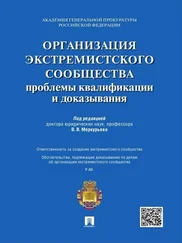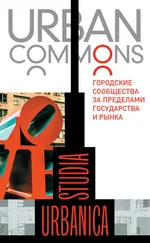Говоря «государственное», мы не указываем на силы районного, регионального и национального уровней, столь часто конфликтующие друг с другом; это обобщение, используемое из соображений краткости.
«Негодующие», или «М15», – испанские политические активисты, чьи требования схожи с требованиями участников «Захвати Уолл-стрит».
George Caffentzis and Silvia Federici, «Commons Against and Beyond Capitalism», Upping the Anti, № 15 (September 2013): 83–97.
Yochai Benkler, «The Political Economy of Commons», in Genes, Bytes and Emissions: To Whom Does the World Belong, ed. Silke Helfrich (Berlin: Heinrich-Böll-Foundation, 2009), 1, 3. http://us.boell.org/2010/10/06/genes-bytes-and-emissions-whom-does-world-belong-economic-governance (accessed January 26, 2015).
Andreas Exner and Brigitte Kratzwald, Solidarische Ökonomie & Commons: Eine Einführung (Vienna: Mandelbaum, 2012), 23.
Silke Helfrich and Jörg Haas, «The Commons: A New Narrative for Our Times», in Genes, Bytes and Emissions: To Whom Does the World Belong, ed. Silke Helfrich (Berlin: Heinrich-Böll-Foundation, 2009), 1. http://us.boell.org/2010/10/06/genes-bytes-and-emissions-whom-does-world-belong-economic-governance (accessed January 26, 2015).
Massimo De Angelis and Stavros Stavrides, «On the Commons: A Public Interview with Massimo De Angelis and Stavros Stavrides», An Architektur & e-flux journal, № 17 (August 2010): 4–7.
David Harvey, Rebel Cities: From the Right to the City to the Urban Revolution (London: Verso, 2012), 73.
Остром Э . Управляя общим: эволюция институтов коллективной деятельности. М.: ИРИСЭН; Мысль, 2010.
Ostrom, Governing the Commons, 91 (цит. по рус. изд.: Остром Э . Управляя общим: эволюция институтов коллективной деятельности. М.: ИРИСЭН; Мысль, 2010. С. 177–178).
Jay Walljasper, «Elinor Ostrom’s 8 Principles for Managing A Commons», On the Commons, October 2, 2011, http://www.onthecommons.org/magazine/elinor-ostroms-8-principles-managing-commmons (accessed December 15, 2014); рус.: https://medium.com/rlntoday/market-failures-3-7a828d785ba7.
David Bollier, «The Commons: A Neglected Sector of Wealth-Creation», in Genes, Bytes and Emissions: To Whom Does the World Belong, ed. Silke Helfrich (Berlin: Heinrich-Böll-Foundation, 2009), 5. http://us.boell.org/2010/10/06/genes-bytes-and-emissions-whom-does-world-belong-economic-governance (accessed January 26, 2015).
Ibid.
Ibid.
Benkler, «The Political Economy of Commons», 1.
См. например: Henri Lefebvre, Writings on Cities, ed. and transl. Eleonore Kofman and Elizabeth Lebas (Oxford: Blackwell, 1996); Henri Lefebvre, The Urban Revolution (Minneapolis: University of Minnesota Press, 2003); Andy Merrifield, Dialectical Urbanism: Social Struggles in the Capitalist City (New York: Monthly Review Press, 2002).
Peter J. Marcotullio and William Solecki, «What is a City? An Essential Definition for Sustainabilty», in Urbanization and Sustainability: Linking Urban Ecology, Environmental Justice and Global Environmental Change (Springer, 2013), 11–25.
Neil Brenner and Christian Schmid, «Planetary Urbanization», in Urban Constellations, ed. Matthew Gandy (Berlin: jovis, 2012), 10–13.
Ibid., 14.
Saskia Sassen, The Global City: New York, London, Tokyo (Princeton, NJ: Princeton University Press, 1991).
Brenner and Schmid, «Planetary Urbanization».
See, for example: Iris Marion Young, Justice and the Politics of Difference (Princeton, NJ: Princeton University Press, 1990).
Harvey, Rebel Cities, 67.
Ananya Roy, «The 21st-Century Metropolis: New Geographies of Theory», Regional Studies, 43, № 6 (2009); 820.
Jennifer Robinson, Ordinary Cities: Between Modernity and Development (London: Routledge, 2006).
Harvey, Rebel Cities, 70.
Ibid., 83.
Ibid., 81.
John Holloway, Crack Capitalism (London: Pluto Press, 2010); см. также эссе Кратцвальд в этом сборнике.
Michael Hardt and Antonio Negri, Commonwealth (Cambridge, MA: Harvard University Press, 2009), 154–156.
Такая стратегия описана в работах Ричарда Флориды, посвященных «креативному классу»: Richard L. Florida, Cities and the Creative Class (New York: Routledge, 2005).
Margit Mayer, «The Onward Sweep of Social Capital: Causes and Consequences for Understanding Cities, Communities and Urban Movements», International Journal of Urban and Regional Research 27, № 1 (March 1, 2003): 110–132.
Andrej Holm and Dirk Gebhardt, eds., Initiativen für ein Recht auf Stadt. Theorie und Praxis städtischer Aneignung (Hamburg: VSA Verlag, 2011), 9 [перевод – Мари Делленбо].
Giovanna Procacci, «Social Economy and the Government of Poverty», in The Foucault Effect. Studies in Governmentality, eds. Graham Burchell, Colin Gordon, and Peter Miller, 151–167 (Chicago: University of Chicago Press, 1991).
Andreas Exner and Brigitte Kratzwald, Solidarische Ökonomie und Commons (Vienna: Mandelbaum Verlag, 2012), 54.
Manuel Castells, «Collective Consumption and Urban Contradictions in Advanced Capitalism», in The Castells Reader on Cities and Social Theory, ed. Ida Susser, 107–129 (Oxford: Blackwell, 2001).
В этой статье мы даем два перевода понятия «commons». Первый – « общее » или « общинное », « общинность » – используется для перевода термина в связи с историческим контекстом Англии XIII в., а также применительно к работам Элинор Остром, Гарри Хардина и других исследователей, работавших с «commons» как с ресурсами общего пользования (в первую очередь в контексте сельского хозяйства). Перевод « совместность » мы используем в отношении «городского общего», создаваемого в практиках современных горожан. Тем самым мы маркируем переход от старого словаря к новому, заново актуализируя специфику, злободневность и проблематичность commons в городском контексте. – Прим. ред. и пер.
Читать дальше
![Коллектив авторов Urban commons. Городские сообщества за пределами государства и рынка [litres] обложка книги](/books/387248/kollektiv-avtorov-urban-commons-gorodskie-soobches-cover.webp)







![Коллектив авторов - Гражданское право. Части вторая и третья. Краткий курс [litres]](/books/404815/kollektiv-avtorov-grazhdanskoe-pravo-chasti-vtoraya-thumb.webp)
![Коллектив авторов - Мозг и сознание [Разгадка величайшей тайны человеческого мозга] [litres]](/books/406124/kollektiv-avtorov-mozg-i-soznanie-razgadka-velicha-thumb.webp)
![Коллектив авторов - Рыба и морепродукты. Закуски, супы, основные блюда и соусы [litres с оптимизированными иллюстрациями]](/books/409945/kollektiv-avtorov-ryba-i-moreprodukty-zakuski-su-thumb.webp)

